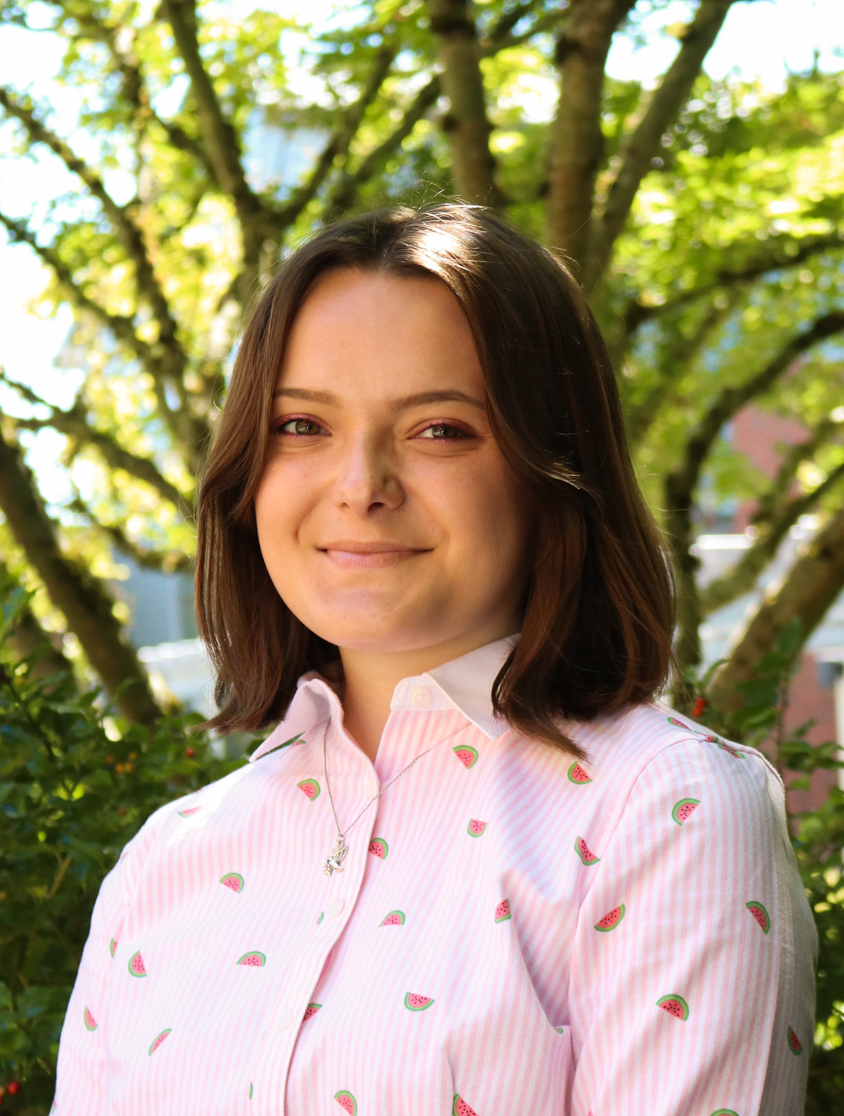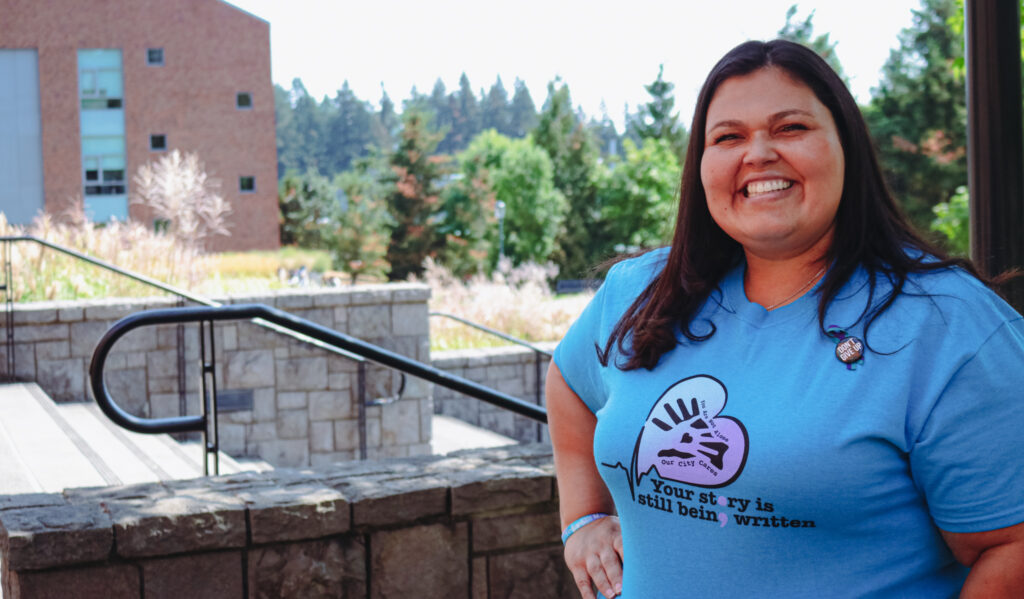Editor’s Note: This story discusses the topic of suicide which may be triggering for some readers.
Suicide is a major public health crisis, and concerns over the issue continue to rise year after year. During 2020, reports of mental health-related emergencies had increased by 31%, according to the Center for Disease Control and Prevention, causing growing distress between communities. While becoming an advocate for suicide prevention and combining her unique passion to spread hope, WSU Vancouver student, Esmeralda “Vita” Blanco, is currently working on a campaign that calls attention to suicide awareness in the Vancouver area and beyond.
As a senior studying integrated strategic communication, Blanco interns with the nonprofit organization, Our City Cares, whose goal is to unite communities in combatting suicide, and bring awareness to the issue within schools, businesses and other organizations. Currently, her mission is to organize and spread the presence of Our City Cares’ Signs of Hope campaign, a movement promoting suicide awareness and resources within a large assortment of schools around Vancouver.
Our City Cares is an organization born out of suicide prevention and awareness efforts established by Joe and Sheryl Stephens, who lost their son Jon by suicide. After witnessing several other suicides in their area, they found that uniting with others in their community, while walking and talking together, was a successful strategy for parents, friends and other family members who had grieved the losses of those close to them. Blanco explains how the couple then asked “what can we do to help others?” and the rest is history.
Summarized by Blanco, there are three initiatives when spreading Signs of Hope, the first being community action, which involves the encouragement of hopeful messages sponsored by local education districts, churches and city governments. The second initiative spreads community information cards containing tangible suicide prevention resources that connect people to services such as first responders and phone numbers of local or national area crisis lines. The third is “walks and talks,” where Our City Cares assembles outdoor activities such as walking or running to aid the mental and physical health of others. After the nonprofit first began its mission, Blanco says therapy surrounding walking and talking was a huge factor in their ambitions to move forward in spreading messages of hope.
“It’s recognized that with mental health providers, getting out and walking in fresh air, and engaging in meaningful conversations with others also contributes to the overall mental health of someone. It doesn’t have to be an organized effort, it
doesn’t have to be black and white per se, it’s making a point to get outside, enjoy parks, enjoy the outdoors, putting down cell phones and just getting out and looking at each other.” – Vita Blanco

Originally, Blanco was an instrumental role in the Associated Students of WSU Vancouver as the outreach director, which had ultimately led her to discover Our City Cares through an effort to support the mental health of the student body. After communicating with them for some time, Blanco became an intern just last year as a campaign organizer, and has worked to support their mission ever since. She says Our City Cares reached 120 schools last year, and their next goal is to have the campaign reach over 200 schools this year.
“We’re hoping that WSU Vancouver would be open to getting our Signs of Hope on campus too. … September is National Suicide Prevention Awareness Month, and our message of hope that we chose for September this year is ‘your life matters,’” Blanco said.
Expressing her struggles during last year’s shutdown due to the COVID-19 pandemic, Blanco says being inside left her feeling isolated and depressed for an extended period. For her, working with Our City Cares inspires and encourages her to move forward, recognizing that it can take an act of kindness from one single person to change another’s life.
“I have a dozen people I know, my daughter’s friends, and I say a dozen easily in the last three to four months that took their lives. I think that’s devastating. What can we do better to give resource phone numbers, messages of hope, let them know there is help?” Blanco said. “We don’t need to be mental health professionals to help somebody, let them know they’re loved, that they’re seen and that they’re heard. … We want to say, here are the tangible resources that you can use in your area that help you have access to a phone number, or if you need food or even if you’re having a hard day.”
Blanco says Our City Cares is always accepting new volunteers, and regularly hosts events to promote suicide awareness. She also encourages other students like herself to get involved, and references community participation as an impactful way to spread suicide awareness and prevention techniques.
“When you get a community involved, a community that cares, that movement goes a long way, which is really exciting to be part of,” Blanco said. “We know that we can do something.”
To learn more about suicide awareness, including dangers, warning signs and identifying those who are at risk, visit the National Alliance on Mental Illness for more information. Always remember there is help available to those who are considering suicide, or might be witnessing another person that is affected. Watch your friends, family and peers for any warning signs, including the expression of suicidal thoughts. Additionally, you can find resources here:
National Suicide Prevention Hotline: (800)-273-8255
Regional Crisis Line: (800)-626-8137
Crisis Text Line: Text HOME to 741741
Veterans Crisis Line: Send a text to 838255
The Trevor Project Line: (866)-488-7386
RAINN National Sexual Assault Hotline: (800)-656-HOPE(4673)
Suicide Prevention Resource Center: https://www.sprc.org
National Alliance on Mental Illness resources: https://www.nami.org/Home
National Institute of Mental Health resources: https://www.nimh.nih.gov/health/topics/suicide-prevention
Washington State Department of Health resources: https://www.doh.wa.gov/YouandYourFamily/InjuryandViolencePrevention/SuicidePrevention
WSU Vancouver Counseling Services: (360)-546-9238
For faculty and staff members, the Employee Assistance Program provides confidential
counseling and referral services at: https://hrs.wsu.edu/resources/employee-assistance-program/

Olivia is a senior studying English at WSU Vancouver.
